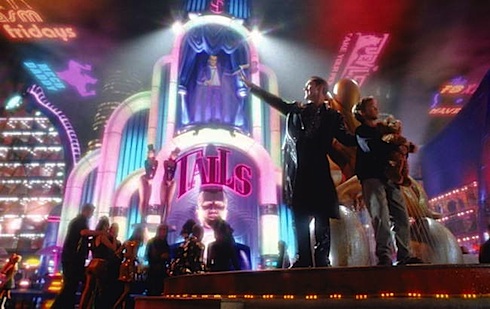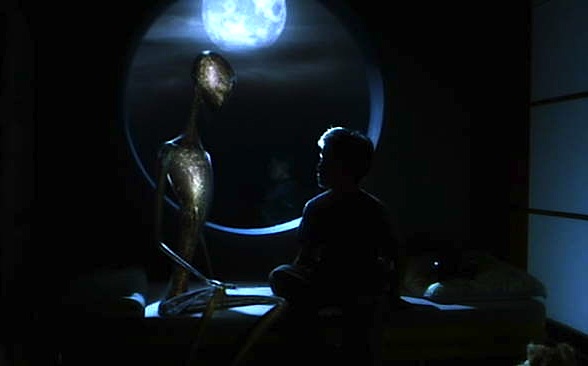Stanley Kubrick spent a number of years following his (excellent) Vietnam picture Full Metal Jacket planning an adaptation of Brian Aldiss’ SF story “Super Toys Last All Summer Long.” The two main problems Kubrick encountered were finding a child actor capable of the necessary caliber of performance, and the technological limitations of late 80s, early 90s special effects. After watching his friend Steven Spielberg’s Jurassic Park, and being awed by the dinosaurs, Kubrick got the sense that visual effects technology had finally caught up with his vision for the Aldiss adaptation, which he was working on under the working title Pinocchio. He also became convinced that Spielberg was a better director for the project than he was himself, and spent the last few years of his life trying to convince a reluctant Spielberg to take the project on. Spielberg demurred, humbly telling Kubrick he was the better filmmaker and that he should direct the picture. The situation was still undecided when Kubrick passed away in 1999 during post-production of Eyes Wide Shut. Spielberg, as a tribute, decided to make the movie he and Kubrick had discussed, which eventually was retitled A.I.: Artificial Intelligence.
The resulting movie is, despite the best attempts of the finest minds in film criticism to find traces of Stanley Kubrick in it, entirely Steven Spielberg’s, for better or (more frequently) worse. As a movie it shows off Spielberg’s mastery of craft—in this regard he is at least Kubrick’s equal; both of them were and are capable of achieving any visceral effect they want through cinematic technique—but as cinematic SF it’s lumpy and unsatisfying, doing an uneven job of world-building, first not introducing its setting at all and then, suddenly, revealing a fascinating one that it fails to explore.
A.I. feels, in a way, like a well-done hour-long episode of a TV show of which we haven’t seen the preceding episode, followed by an hour and a half of a dystopian yet tame SF chase movie missing its last act, followed by a twenty minute rewrite/oversimplification of the last chapter of 2001 (that has nothing to do with the chase movie, but is kind of a resolution of one of the least interesting plot strands from the the hypothetical TV show.) Most frustrating in all this structural lumpiness is the fact there are some good performances and intriguing ideas in the mix. Haley Joel Osment and Jude Law are both quite good as robots who can never possibly get back what they give to their human masters, who are almost unanimously depicted as emotionally dead and cruel. The idea that humanity, in response to ecological disasters that, among other things, flooded New York city up to nearly the tops of its skyscrapers, turned to robots to help cut down on the overpopulation that led to the disaster is an interesting one. But it’s an idea that we’re told rather than shown, and there are a number of logical loopholes in it. For example, the movie seems undecided about whether robot children are commonplace enough that couples who’ve lost their real child might, as a matter of course, adopt a robot replacement—the way it seems at the beginning of the movie—or whether Haley Joel Osment is the first robot child ever manufactured, which is what a number of people suddenly reveal is the case. There is a difference between a twisty, surprising narrative and one that keeps suddenly saying “Oh, and by the way, this thing you probably should have known about a half hour ago exists,” and A.I. is, unfortunately, the latter.

There is some good, though, in A.I. For all the problems with Spielberg’s script, his direction is solid. In spite of myself I still got caught up emotionally in it, because of the sheer force of Spielberg’s ability to evoke emotion with nothing more than camera moves, edits, and John Williams music cues. Call it manipulative all you like, and in this case as in many of his other misfires all this emotion is almost completely divorced from the script, but Spielberg is Spielberg. He can make an audience feel however he chooses (thinking, of course, is another matter….)

The worst part about this whole thing is that the ARG that was part of A.I.‘s promotional campaign was both awesome and painted a fascinating portrait of the movie’s 22nd century setting. I spent almost the whole summer of 2001 playing that game, looking for the person(s) who killed the scientist. I miss that time, playing that game on my dial-up connection, looking forward to seeing this movie where the immensely talented Spielberg would bring the late master Stanley Kubrick’s vision to life. Maybe that’s my whole problem with A.I. Maybe nothing could possibly have been that good.
In any case, wanting to see a new Stanley Kubrick movie was foolish, and expecting one from Spielberg, a profoundly different artist and man, even more so. Fortunately, as far as Stanley Kubrick (and Spielberg, for that matter) is concerned, there are still the movies he got around to making. Those are still around, and they’re still every bit as fascinating as they ever were.

Danny Bowes is a playwright, filmmaker and blogger. He is also a contributor to nytheatre.com and Premiere.com.










